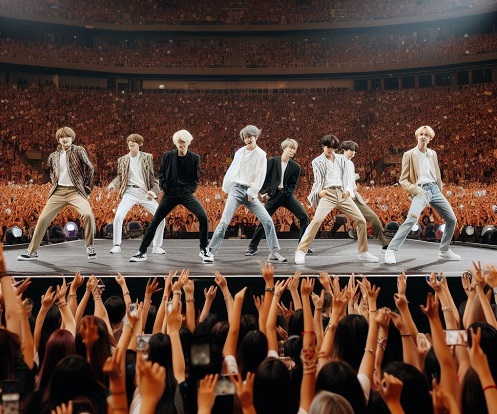K-pop idols face a variety of challenges in their careers, including
1. Intense training and competition: K-pop idols undergo rigorous and intensive training for several years before they debut. The competition is fierce, and only a small percentage of trainees make it to the debut stage.
2. Busy schedules: K-pop idols have busy schedules that can be physically and mentally demanding. They may have to attend rehearsals, recording sessions, interviews, and performances, often with little time for rest or leisure activities.
3. Pressure to maintain a certain image: K-pop idols are expected to maintain a certain image, which can include strict diet and exercise regimens, as well as strict rules regarding their personal lives and behavior.
4. Language barriers: K-pop idols often have to communicate in multiple languages, including Korean, English, and sometimes other languages, which can be challenging and require additional training.
5. Fan scrutiny: K-pop idols are often under intense scrutiny from fans, who may closely monitor their social media activity and personal lives.
6. Mental health issues: The pressure and stress of the K-pop industry can lead to mental health issues such as anxiety, depression, and burnout. Some K-pop idols have spoken out about the need for better mental health support in the industry.
7. Lack of privacy: K-pop idols often have limited privacy, as they are constantly in the public eye and may have little time for personal activities or relationships outside of their work.
Despite these challenges, many K-pop idols are able to achieve great success and enjoy a rewarding career in the industry.
How many hours do kpop idols sleep?
The amount of sleep that K-pop idols get can vary depending on their schedules and commitments. However, it is common for K-pop idols to have very busy schedules that can be physically and mentally demanding, which can affect their sleep patterns.
During promotions or tours, K-pop idols may have very little time for sleep and may have to sleep on the go, such as in cars or planes. It is not uncommon for K-pop idols to have schedules that start early in the morning and go late into the night, leaving little time for sleep.
In general, it is recommended that adults get 7-9 hours of sleep per night for optimal health and well-being. However, due to the demanding nature of the K-pop industry, it is possible that some idols may get less sleep than this on a regular basis.
It is important to note that sleep is vital for maintaining good physical and mental health, and getting enough sleep is important for everyone, including K-pop idols. K-pop agencies have been known to implement sleep schedules and rest periods for their idols in order to ensure their health and well-being.
What are some controversies surrounding the K-pop industry?
The K-pop industry has faced several controversies over the years. Here are some examples:
1. Exploitation of trainees: There have been reports of exploitation and mistreatment of trainees in the K-pop industry, including long working hours, low pay, and abusive behavior by entertainment agencies.
2. Strict control over idols: K-pop idols are often subjected to strict control over their personal lives and behavior, including restrictions on dating and other relationships.
3. Mental health issues: The pressure and stress of the K-pop industry have led to mental health issues among some idols, including anxiety, depression, and suicide.
4. Cultural appropriation: Some K-pop groups have faced criticism for appropriating cultures, including African American and Native American cultures, without proper understanding or respect.
5. Plagiarism and copyright infringement: Some K-pop songs have been accused of plagiarism or copyright infringement, leading to legal disputes and controversy.
6. Fan culture: Some K-pop fans have been criticized for engaging in toxic behavior, including online harassment and stalking of idols.
7. Lack of diversity: The K-pop industry has been criticized for a lack of diversity, both in terms of race and body type, with some groups facing accusations of promoting unrealistic beauty standards.
It is important to note that while the K-pop industry has faced these controversies, there are also many positive aspects to the industry, including its role in promoting Korean culture and music around the world.
high-paying job Kpop Idols Singer





